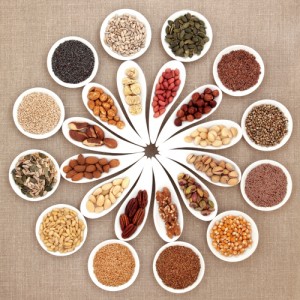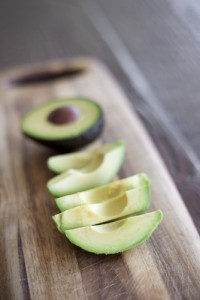For years, in the media and mainstream fish and fish oil supplements have been promoted as one of the “basic” supplements that most everyone should take. So it has always been amusing to me to see the surprised look on people’s faces, when they proudly tell me they take fish oil, that I don’t recommend it (for reasons we’ll get into below).
Fish oils’ stated purpose is as a “healthy” way to get your omega-3 fatty acids into your diet for heart health, brain function, and a number of other ailments. Fish oil has been made out to be a health superstar. But you won’t catch me cheering for it. Despite it’s favorable repute in the past, it’s still a processed entity that is not a whole food, can be derived from fish caught in polluted, dangerously contaminated waters, and even the so-called “clean” fish oil supplements may be rancid at the time of consumption.
A new side effect has come to light recently, that has tarnished fish oil’s reputation. Fish and fish oil consumption have been linked to an increased risk for prostate cancer in a study the Journal of the National Cancer Institute published online on July 11.
Fish, Fish Oil Supplements, and Prostate Cancer

Why Do People Even Need Fish Oil?
Well, the truth is nobody actually needs fish oil, exactly. But we do need to balance our diets, and our essential fatty acid (EFA) ratio. Because there are so many omega 6 foods in the modern diet (especially the woeful Standard American Diet), most people need to consume less omega-6’s and add more omega-3 fatty acids to their diet. That’s right, it’s an equation! Adding and subtracting to create balance. In most cases, people consume way too much omega-6s into their diet, largely from the vegetable oils used not only in cooking but resplendent in some form in virtually all processed foods. This does not exclude vegans, as highly processed, vegan foods like vegan butters, mayonnaise, etc. are made from a very high percentage of vegetable oil and are unfortunately quite popular in vegan recipes and restaurants. But the omega-3s aren’t as built-in or easy to eat without perhaps being more conscious of doing so… though they’re so simple to incorporate once you make the effort to do so and include them!
Your body can’t produce its own omega-3s, nor can it get them from omega-6 fatty acids. Omega-3s protect against heart disease and stroke, control blood clotting, reduce inflammation, help build cell walls in the brain, make skin soft and smooth, promote joint and bone health, and improve mental health. There’s no denying that omega-3s are a must-have, but you you should look to balance your EFA overall by cutting out processed, high vegetable-oil foods, and sourcing omega-3s from cleaner sources than fish oil pills.
Maybe Fish and Fish Oil Aren’t to Blame, But…
A 2001 study that focused on Swedish men made the opposite claim, that fish consumption reduces the risk of prostate cancer. That study found that men who didn’t eat fish had two to three times the risk of developing prostate cancer than the men who consumed moderate to high amounts of fish. 
But remember, most studies are very specific and can be skewed to present a given outcome. As T. Colin Campbell, PhD states, ” …a lot of so-called health breakthroughs are not nearly as impressive as their marketing makes them appear….One of the ways to do this (without outright lying) is to cherry-pick details, report them out of context, and imply a much greater significance than they actually possess.”
Since fish is one of the most polluted foods you can eat and fish oil capsules are often rancid and full of toxins as well, it’s still much safer to go the plant route of obtaining omega-3 fatty acids and DHA to keep your likelihood of developing prostate cancer as low as possible. Eating fish adds toxins like mercury to your body even without the risk of prostate cancer.
Plant-Based Sources of Omega-3s
If you’ve just been convinced to swear off fish forever (or just most of the time), you’re not out of luck in the omega-3 fatty acids department. After all, they’re essential for good health, so they have to come from somewhere!
And you can still get your health-promoting omega-3s from plant foods, and it’s much more delicious to do it that way than to swallow fish oil pills, plus you won’t have any more of those nasty fish burps that happen after you take the supplements. Some of the best plant-based omega-3 sources (Beauty Fats) include:
- Flaxseed (one tablespoon of ground flaxseed covers you for the whole day)
- Avocados (these are also a healthy source of omega-6 fatty acids)
- Chia seeds
- Hemp seeds
- Nuts (especially walnuts)
- Pumpkin seeds
- Brussels sprouts
- Dark leafy green vegetables (another reason to drink your daily GGS!)
Don’t Forget the DHA
When you consume plant-based omega-3s, your body needs to convert them into EPA and DHA fats (two of the most important fatty acids for good health), and the ability to convert omega-3 fatty acids to DHA varies from person to person. You can get plenty of omega-3s from your fish-free diet, but for a boost in your DHA levels, an algae-based DHA supplement is perfect. I like the Flora brand. This supplement is good for your overall health and brain and nerve function. Again, the reason fish are rich in DHA is because they eat algae. So why not go to the primary source and eat the algae directly?
Trade in the Fish and Supplements for Plant Sources
So do fish and fish oil supplements contribute to prostate cancer? Maybe. Studies go both ways, but the newer information suggests that they do. But while studies can always give conflicting results, the big picture is this: waterways that fish live in are polluted; so the fish are too, fish oils are often rancid, and fish oil in general is not a whole food.
I recommend choosing whole, plant-based sources of omega-3s, eating fish rarely if at all, and skipping the fish oil supplements completely, just to err on the side of caution. There are so many other sources of omega-3s that you can effortlessly add to your salads and smoothies (among other things), why take the risk? You can also take the algae-based DHA supplement. Here are some of my favorite recipes that feature Beauty Fat plant sources of omega-3s:
- Raw Tabouli Hemp Seed Salad
- Raw Taco Mexican Salad (This one’s a double-whammy with the avocado and walnuts!)
- Macadamia Nut and Sundried Tomato Mash
- Open-Faced Avo Beauty Sandwich
- Chia Seed Delight
- Raw Acai-Goji Granola



While I agree with most of your article, one question popped up as I read it. If you say that fish swim in contaminated waters and yet eats algae and we
Should get our Omega 3s from the source itself, well…isn’t the algae you recommend from the same contaminated waters? Please clarify.
Thanks
So algae isn’t contaminated with the same things fish is?!
hi there, i live in New Zealand and love reading your emails that come to me. Just wondering about this story with the omega-3 fish oil now. I heard it on the tv here as well, I have have been struggling with osteoarthrises for some time now and was told to take omega-3 fishoil for it along with other stuff, now i hear that it is not that good for you, so what do i do, what do i take in it’s place?
thanks
Diane
Thank you for bringing awareness to this very important subject. People don’t know that the fish oil they are taking doesn’t work and is probably toxic and harming their health. My company, Touchstone Essentials, took this problem very seriously and we are now producing, Wellspring, an organic plant- based fatty acid product. It is made from
• Organic Borage Oil
• Organic Flax Seed Oil
• Organic Pumpkin Seed Oil
• Organic Extra Virgin Coconut Oil
Please take the time to investigate this product. We are seeing tremendous results.
Hi kim
I read the ingredients of Flora brand that you recommend & it has carageenan, I thought that was not good for us,please advise, Thank you so much, you are an ispiration
I made the Raw Taco Mexican Salad the other night and it was great. I didn’t have avacados but it was great anyway. My husband asked “Where’s The Beef” like the old commercial. I said it’s nuts and we don’t need meat every night. We both loved it. Who would have thought that nuts cold actually mimic ground beef. Great job Kimberly.
With regards to fish oil supplement findings – does that mean that women should not take fish oil supplements as well and just get it from a food source? Thank you.
We eat lots of nuts (almonds, walnuts, cashews), lots of avacado, coconut oil, and uncooked olive oil. We don’t eat any processed foods. We cook in coconut oil. And we eat a little organic butter from grass fed dairy sources. We eat mostly organic chicken with some fish and very, very little organic grass fed beef. And, of course, one smoothie a day.
We also supplement with one krill oil pill a day. Krill oil is supposed to be free of all the toxins that are in fish. Is that okay? Are we out of balance? Do we get too much omega 3. Is krill oil a good idea? Dr. Mercola seems to think that its an essential supplement. He reccomends very few, but krill oil is one of them. What do you think.
Is wild caught fish….ie vital choice safe….I order from there.
Love this post. People need to be aware of this stuff! I take the Nordic Naturals Algae Omega supplements. I love them!
Very good information I was currently looking for an alternative.
the flora DHA additional ingredients contain carageenan (disruptive to the digestive system!?)
here is the list:Medium-chain triglycerides, high oleic sunflower oil, modified food starch, carrageenan, glycerin, sodium carbonate / sorbitol,rosemary extract, sunflower lecithin, mixed tocopherols, ascorbyl palmitate, purified water
is this ok according to you to take on a daily basis ?
Fish oil supplements have been encouraged for my dog, but after reading this I’m pretty sure I don’t want to give them to her. Would you recommend the same things like avocado or chia seeds for a canine?
I am with you on the plant based omegas and DHA versus fish oil, as I did not enjoy the “fish burps” back when I used to take fish oil. But I do think this current study seems too imperfect to draw the causal connection it claims. I’m always skeptical of studies, because it’s hard to know which ones to trust. But doing some research on this, a number of articles point out flaws in this study, so I question whether it’s actually the fish oil which is the culprit.
In terms of flax, is there a particular oil brand that you like?
Please provide the link for the scientific paper for the study published july 11. thanks
Thanks for this info Kimberly! I’ve been looking into algae as a good source of nutrition lately. Is there a supplement that would have a higher ratio of EPA to DHA for mood balance?
GREAT article, Kimberly.
I couldn’t have said it better, myself ! ;)
MANY BLESSINGS ! ,
Nikki K.
CHHC
Great! Thank you Kimberly!
Hi, I have just a question before I go buy algeas :)
If fish is full of toxin, isn´t algeas also toxic as they grow in the oceans??
Thanks for a great blogg :)
Nina from Sweden
Thank you for this information and giving us alternatives. Fish Oil is one of many trends in supplements that we take just because of the marketing and word-of-mouth recommendations. It is good to have more clarity. How about calcium? are we (especially women) doing the right thing taking high doses of calcium in supplements? can we process all of it or does it pile up in our arteries or in any other undesired place? would love your thoughts
One ingredient in Flora DHA is carrageenan. As far as I know this is to be avoided.
Yes, I am also confused. The DHA product by Flora that you recommend in your blog not only contains carrageenan, but also sorbitol. Aren’t these two ingredients so vehemently warned against consuming? Can you unravel the confusion please? Thank you
Clearly understanding the OPs info I accept it as it’s valid so its nice to read from a blogger that is blogging stuff like this for all to review.
Yet another example of a warped study.”… Anything can be proven wrong or right
Hey there, Im 62 and living in the US and I have been taking fish oil supplements for several years and this is the first I have heard of this. Is this strictly for farmed fish in certain areas or does this extend to wild salmon and lake fish as well …
We are often to blogging and site-building i truly appreciate your site content. This content offers in fact mountains our awareness. I’ll save your website as well as carry looking for fresh details.
Green coffee would be the outcome of brewing unroasted coffees or precisely what is also known as coffee fruit. As we all know, the bitterness on the coffee that many of us enjoy today would be the product of brewing dark espresso beans. But before they become such as this they wanted to be roasted to perfection. In 1100AD, the tactic of roasting hasn’t been yet practiced so people brewed green espresso beans to generate a tea-like beverage. The goods of brewing green coffee bean remains to be employed to develop varieties of Arabic coffee today.
I need to to thank you for this very goodd read!! I certainly enjoyed every little bit of it.
I’ve got you book marked to look at new things you post…